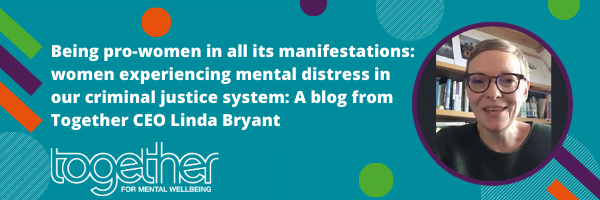Women’s Mental Health in Police Stations and Prisons – a blog by Together CEO Linda Bryant

For International Women’s Day 2021 we’re sharing a blog which started from a presentation our CEO, Linda Bryant, gave at the Fabian Women Fringe event in January this year as part of the Fabian Society Annual Conference 2021. Further insight for the blog was provided by two Together staff members who work specifically with women in police stations and court settings who have experienced mental distress – Jan Roberts who is the Women’s Forensic Mental Health Practitioner at Thames Magistrates’ Court and Ioanna Palioura, Interim Implementation Manager at Westminster Magistrates’ Court as part of the RECONNECT Project, which aims to support prisoners with complex health needs into the community.
A view from a provider – the situation for women in crisis as they encounter police and courts currently, and what best practice could offer
I was delighted to be asked to speak at the Fabian Women’s Network event on an area that is close to my heart. Together for Mental Wellbeing is a national mental health charity and for most women coming into contact with the criminal justice system, they will be in crisis to some degree or other including experiencing mental distress. I started my address to the fringe event by asking a question:
From the perspective of a mental health support provider like Together, what do women face as they encounter our police, our courts and our prisons?
Firstly, we know women are met by systems that were built for and by men who are at the top of the dominant caste in this country, and specifically white men, so women are already at a disadvantage. Whilst recent years have seen the impact of training and education improve gender-specific and trauma-informed practices, more still needs to be to increase the knowledge and understanding of the specific needs of women by both criminal justice and health professionals.
Women are often judged harshly. They are at risk of being charged for offences and remanded in custody for actions they have taken in defence of abuse suffered at the hands of partners. Time and again our team at Together will support women who have been charged with assault after an abusive partner has called the police and it is the woman who is arrested.
And after years of trauma, the mental distress for some women that we see in our criminal justice services is so serious that they require hospitalisation under the Mental Health Act (MHA). Currently, this may mean a woman being remanded into custody before being transferred to hospital for treatment. Nobody would consider prison an appropriate place to be for someone in crisis. It is of huge significance that reforms of the Mental Health Act (MHA) Reform White Paper published in January 2021 gives a commitment to end the practice of using prisons as ‘places of safety’ for defendants with acute mental illness.
Women are not a homogenous group and there are distinct challenges for women who are considered to be foreign nationals. Our experience of supporting these women is that they face many additional hurdles as they go through the justice system, particularly being able to understand their rights and legal proceedings. We also know that opportunities can be missed to undertake proper, comprehensive assessment of vulnerability due to a lack of appropriately trained interpreters.
In terms of Young Women, Agenda recently published a Young Women’s Justice Project Literature Review. Regretfully, there is a lot we don’t know about young women’s experiences but research has shown that up to 90% of young women have experienced abuse from a family member or someone they trusted they encounter our justice system (source: https://www.cypnow.co.uk/news/article/nine-in-ten-female-young-offenders-are-victims-of-abuse-research-finds). A worrying trend is that the use of force, physical restraint and isolation is increasingly and disproportionately used against girls in custody settings to manage behaviour and even to prevent self-harm. Racial stereotyping affects how justice agencies respond to young adult women from Black and ethnic minority groups, meaning they face a ‘double disadvantage’ as gender intersects with race.
So what are the solutions we’ve seen and what is already happening? Well, I’m not alone in sharing a view that women shouldn’t be in prison and that in fact we shouldn’t have women’s prisons. In the absence of a more humane system, community options should always be considered first with prison as the last resort. Prison is the alternative to community. If a woman’s behaviour is deemed to put others at risk, we need to understand the causes behind her behaviours and work with her in the safest way possible in the least restrictive setting. That doesn’t mean women are not subject to judicial processes but it does mean she is given the best life chances to overcome a history that will more than likely include extreme trauma.
Strengthening the policies of prevention need to be a priority so women don’t experience support for their mental distress in isolation to the rest of their life experiences. Poverty, debt, poor housing or homelessness, substance and alcohol misuse, racial discrimination, lack of education and employment need to be part of a ‘whole-woman’ response. Local authorities, the main funder of social care in the community need to actively demonstrate radical empathy – educate themselves of the needs of women, to listen and understand experiences from the woman’s perspective, avoid assumptions and judgements and do something about what they hear – it is no longer enough to refer to the Equality Act. This is about being pro-women in all its manifestations.
An example of being pro-women in all its manifestations and providing individual, tailored support are the brilliant women centres around the country but there are not enough of them. A national programme of women centres has long since been advocated for and was a key finding in Baroness Corston’s report (from 14 years ago!). There is a policy of early intervention at arrest stage for women but diversionary schemes must be more widely available and the criteria for considering a woman’s eligibility needs to be expanded. For example, too many women subjected to domestic violence who are then arrested within that context are not eligible to access those schemes. The NHSE-led National Liaison & Diversion programme with mental health practitioners in all police and courts up and down the country has been a fantastic initiative focusing on all ages and all vulnerability but we still need more women specialist roles, trained in trauma-informed practice.
Over recent years we have had a programme of ‘speedy’ justice in our courts. We need to recognise that for some defendants, particularly women, there needs to be the latitude to slow that process down. We need to allow time for assessments that reflect the complexity of women’s needs and to deliver equity to all people coming through courts, particularly of women from ethnic minority groups, and particularly those at risk of trafficking and exploitation.
Today, I celebrate with all women for International Women’s Day. But please remember the many women in our prisons today who are without their children, their families and struggle to feel hope for their futures. We need to hold that hope on their behalf.
Linda Bryant, CEO, Together for Mental Wellbeing


